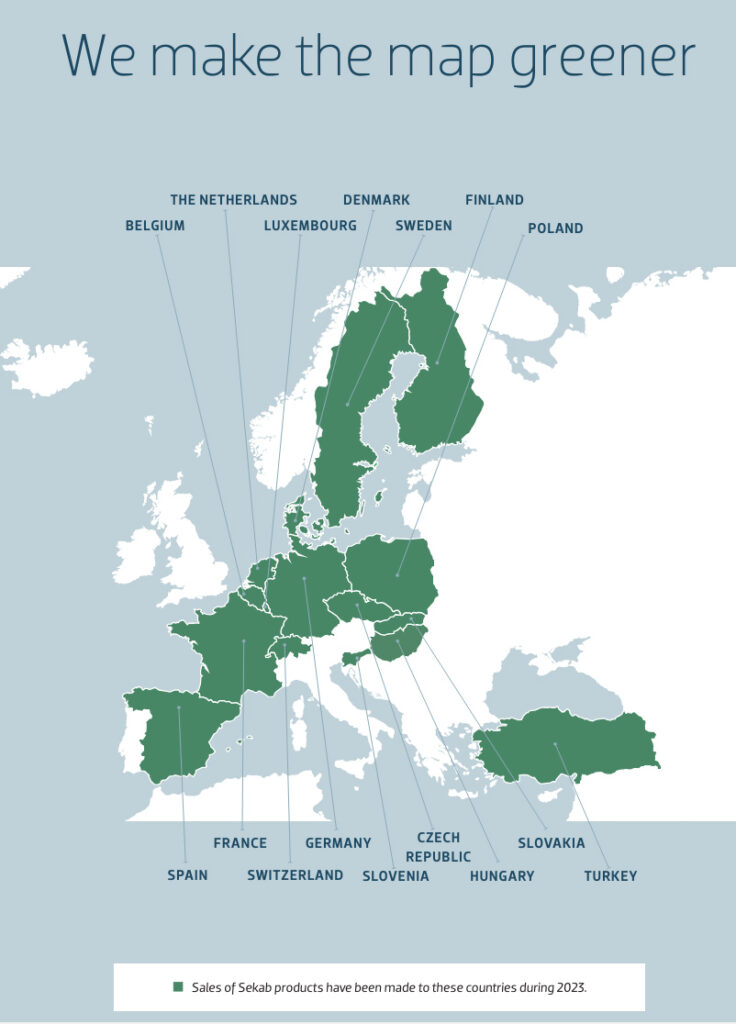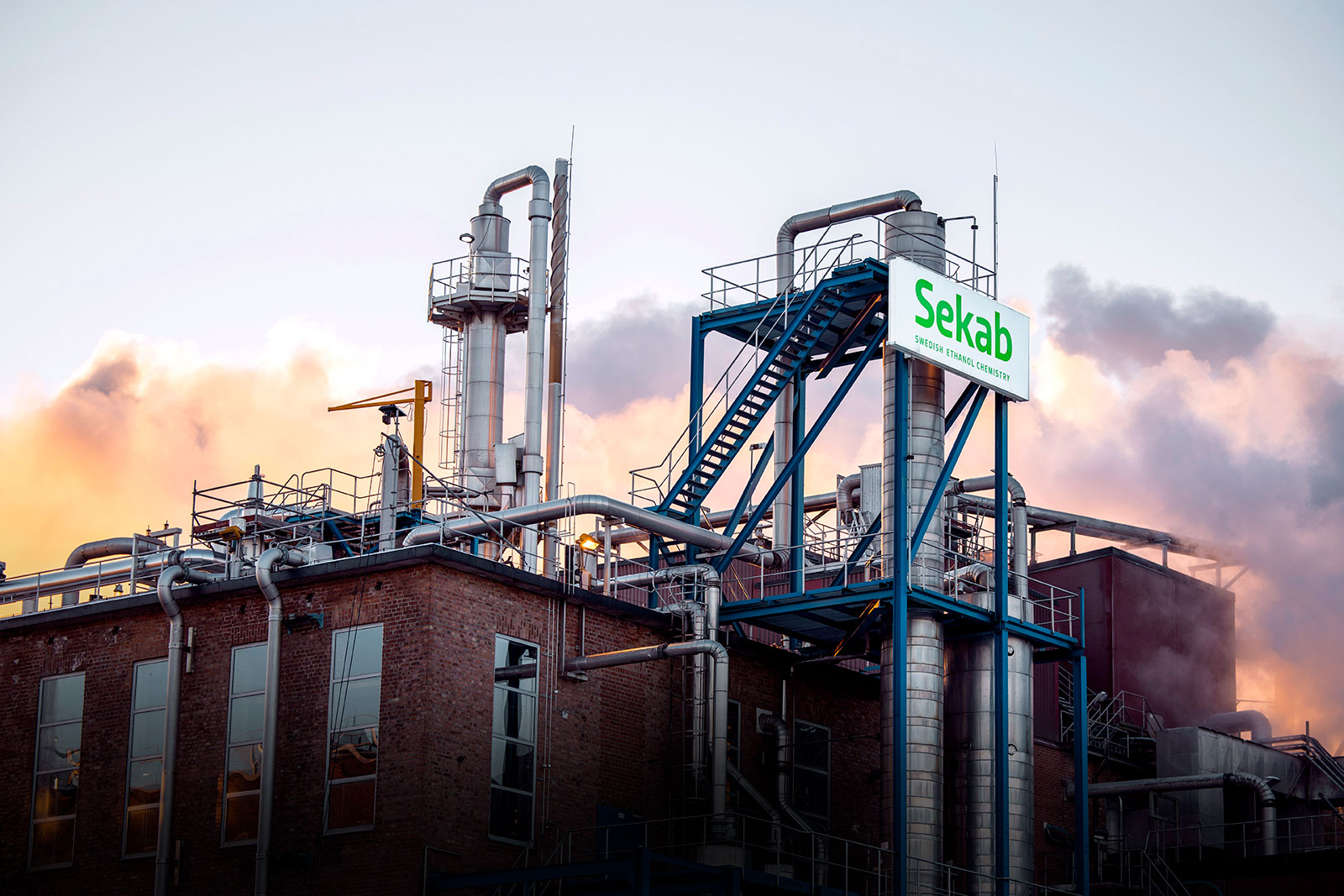96 percent of everything that is manufactured needs chemicals. They are found in all everyday products around us from the paint on the wall, to our clothes and children’s toys. The absolute majority of the chemicals used globally today are made from fossil raw materials. Sekab offers the chemical industry green alternatives on the way to an absolutely necessary transition. Our chemicals are building blocks needed to manufacture sustainable end products such as lacquers, paints, glues, plastics, cosmetics, pharmaceuticals, cleaning products and packaging.
Sustainability is not just a part of our operations; it is the very core of our entire business. Our sustainability efforts are based on the UN’s global goals. Sekab’s biobased products contribute to a more sustainable world and reduced climate emissions, and we also work towards social sustainability by being a good employer and an active participant in our local community.
Sekab’s biobased chemicals help our customers phase out unsustainable products and processes. We are part of a green industrial revolution that is fundamentally changing how we produce goods and services. We create value for owners, employees, customers, and society by driving development towards a sustainable society and increasing the use of renewable raw materials and sustainable products.
We are a part of the Science Based Targets initiative, a global body that offers a methodology and framework that guides companies to set science-based emissions targets to contribute to limited global warming in line with the goals of the Paris Agreement. The initiative is a collaboration between the UN’s Global Compact, CDP, the World Resources Institute and the World Wide Fund for Nature.

At Sekab, we manufacture sustainable, green chemicals from biobased raw materials. They are just as good as their fossil counterparts, while also doing good for the world. We offer the chemical industry green alternatives without contributing to increased climate impact emissions.
Sekab is a chemical company with a full focus on conducting sustainable business—both literally and figuratively. With 100 years of experience and great ambitions, we are a challenger and a crucial art of the necessary transition in the industry.
In our production facility located in High Coast Innovation Park in Örnsköldsvik, we refine and convert large quantities of bioethanol into chemical products such as acetaldehyde, ethyl acetate, acetic acid, and various blends on a weekly basis.
Sekab’s research and development department is outstanding and strategically important for the overall growth of the company, driving forward with new initiatives and collaborations
Business model
Sekab’s bio-based chemicals and fuels help our customers phase out unsustainable products and processes. We are a part of a green industrial revolution that is fundamentally changing how we produce goods and services.
We create value for owners, employees, customers and society by driving the development toward a sustainable society and increasing the use of renewable raw materials and sustainable products.

How we work
Sustainability is not just a part of our business; it is the very core of everything we do. Our commitment to sustainability is firmly anchored in the UN’s global goals outlined in Agenda 2030. These goals provide the overarching framework that guides us in identifying and addressing various aspects of sustainability within our operations.
IN OUR SUSTAINABILITY REPORT, the global goals serve as a structuring force. We have integrated these goals into our four focus areas and have clearly identified the seven specific goals where we can make the most tangible difference. This provides us with clear guidance and support for implementing and measuring our sustainability efforts.
Our green chemicals are produced and sold from our facility in Örnsköldsvik. We manage our operations in accordance with the environmental standard ISO 14001 and the quality standard ISO 9001. These standards are crucial for ensuring both internal efficiency and transparency towards external stakeholders.
IN 2023, WE TOOK FURTHER STEPS towards sustainability by joining the independent sustainability system Science Based Targets, where our sustainability goals have been scientifically approved. Additionally, we have achieved gold status and are among the top five percent of all valued companies in the globally leading evaluation system EcoVadis, aiming to reach the highest level, platinum, and the top one percent in the near future.

OUR CERTIFICATIONS AND AMBITIOUS GOALS are reflected in our governance documents. The overarching company policy for environment, safety, and occupational health stands as our primary guidance for realizing these goals. This policy forms the basis for our internal and external guidelines and creates a robust framework for our sustainability efforts.
OUR CODE OF CONDUCT SERVES AS CLEAR GUIDANCE for how we act as employers and business partners. It is rooted in the ten principles of the UN Global Compact and covers areas also addressed by our three other policies: equality and diversity policy, procurement policy, and sales policy. These policies are all integrated into our overall sustainability strategy and reflect our commitment to sustainable and ethical business. We continue to strive to be a leader in sustainability and look forward to continuing our work for a better and more sustainable world.
For a supplier in the industrial value chain, it is crucial to be a reliable partner. Therefore, our structured work with analyzing and managing risks is a prioritized issue in our operations.
AN ESSENTIAL ASPECT OF operational management is to continuously analyze and address the risks that may have a negative impact on Sekab. A thorough understanding of these risks and monitoring changes in the risk landscape provide the basis for well-informed decisions. These decisions, in turn, contribute to creating opportunities and fulfilling the company’s strategic goals.
To ensure a comprehensive overview of the risks facing the business, we work systematically to identify, analyze, assess, and manage risks. Additionally, risk analyses are conducted regularly in connection with projects, investments, and changes in operations. The annual strategic risk process results in a number of identified risks with varying levels of priority. Risks are categorized as financial, operational, or strategic risks.
Financial risks have the potential to impact Sekab’s financial performance and position. We may be exposed to interest rate risk, currency risk, credit risk, financing risk, and liquidity risk.
Operational risks can be directly attributed to Sekab’s business operations with potential impacts on sustainability, financial results, and position.
Strategic risks can result in long-term consequences for Sekab’s business operations. These could include changes in the external environment with potentially significant effects on us across multiple fronts.
Our risks are primarily operational, closely linked to our focus areas. Following is an account of these risks:
IT risks
That the IT environment functions satisfactorily, is secure, and well protected is a prerequisite for Sekab’s operations. Identified risk areas are IT attacks and inadequate maintenance that can lead to direct operational disruptions. Therefore, we conduct systematic IT security work, which consists of mapping IT risks, monitoring the external environment, and ongoing development and maintenance.
Focus area: Responsible business
Work environment
Sekab’s operations involve handling large quantities of flammable substances. A process accident in the chemical plant can result in serious harm to people, the environment, and property. Legally, a serious workplace accident can lead to fines or other legal sanctions. To prevent incidents and accidents in the workplace, Sekab systematically addresses occupational health, safety, and fire protection issues.
Focus area: Employees
Environmental risks
Sekab’s operations involve the handling of large quantities of chemicals. Incidents in this area could have significant consequences for the entire operation. These may include spills, fires, or explosions that pose a serious risk to human health and the environment both within and outside the facility. Therefore, our collective preventive efforts are crucial, and consideration for the external environment is always a top priority in Sekab’s operations. As part of our environmental efforts, we continuously monitor and evaluate our operations from an environmental perspective to prevent unwanted incidents. For example, all process equipment undergoes regular safety inspections, and risk assessments are conducted continuously to enhance safety and mitigate risks. A large number of inspections and checks are carried out by both external authorized experts and our own personnel.
Focus area: Climate and energy
Risks of Regulatory Changes
Laws, regulations, and policies regarding ethanol, fuels, and chemicals can impact production conditions and profitability. Therefore, active monitoring of changes and adjustments to operations based on these is crucial. By actively participating in debates and decision-making groups, Sekab can advocate for favorable conditions for bio-based chemicals.
Focus Area: Social Responsibility
Infrastructure Risks
Sekab’s products are currently primarily delivered through sea and rail transportation. Secure deliveries on time are high priorities for our customers. By having the ability to deliver through various options, we make ourselves less dependent on a single mode of transportation. Furthermore, we actively engage in forums, inform, and engage in dialogue with decision-makers to ensure that infrastructure issues related to our operations are high on the agenda..
Focus Area: Responsible Business
Ethical Risks
Ethical risks may involve Sekab’s employees not acting in accordance with the company’s code of conduct. Risks may also be associated with ethical violations in the supply chain. Good business ethics and transparency should permeate everything we do. A clear code of conduct, a new internal structure for contract formulation, and continuous supplier checks prevent ethical risks and corruption.
Focus Area: Responsible Business
Risks related to suppliers
If suppliers act in violation of applicable laws, conventions, and agreed-upon terms, this can lead to quality issues, delivery delays, and production interruptions, which can have a negative impact on Sekab’s profitability and brand. Sekab’s environmental and code of conduct are always communicated to the supplier, clarifying our expectations. Through supplier assessments, we obtain a qualitative assessment of our major suppliers.
Focus area: Responsible business
Competency risks
Attracting, recruiting, retaining, and developing employees is crucial for competitiveness in both the short and long term. We encourage competence development and ensure that the company has the right skills through strategic work with competence supply plans.
Focus area: Employees